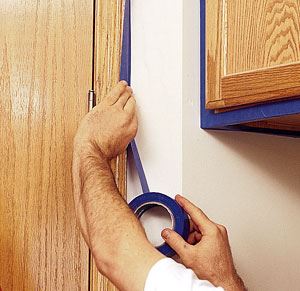 While taping walls before painting might not appear to be a difficult skill to master, properly applied painter’s tape makes all the difference in producing a professional looking result. Even expert painting contractors take great care in placing (and removing) painter’s tape.
While taping walls before painting might not appear to be a difficult skill to master, properly applied painter’s tape makes all the difference in producing a professional looking result. Even expert painting contractors take great care in placing (and removing) painter’s tape.
First, supply yourself with several rolls of painters tape. 3M’s blue tape is the best kind for most jobs, and it is most helpful to have a couple of different widths at hand. Tip: never apply tape to paint that is not entirely cured. Wait 1-2 days after painting before applying tape to the painted surface.
If you are taping a line where two colors will meet on a flat surface, use a level to draw a light pencil line. If you are taping an edge or corner, use the edge as your gude. Instead of trying to place a long piece of tape all at once, use a number of shorter pieces (2-3 feet). This helps you to avoid creases and bends.
Line up one end of your piece at one edge, and pull the other end taught (but not stretched tight). Use one finger to lightly press the tape into place, running from the stuck end towards the free one. Once the tape is correctly in place, run a finger along the tape again, firmly sealing the edge where the paint will meet it. Leave the non-painted edge loose.
It is important to apply painter’s tape carefully and methodically throughout your work area. Place it in any location where two colors will meet, such as corners, door and window trim, baseboards and moldings. Also use it to protect surfaces that will not be painted: door hinges, window glass, and similar items.
Now comes the fun part; you are ready to paint! Make sure that you remove your tape before the paint is thoroughly dried, or it will tear and ruin your work. Wait at least 30 minutes, but no longer than 6 hours. If you are doing multiple coats, your safest plan is to apply new tape for each coat.
ALLBRiGHT 1-800-PAINTING enjoys serving the San Clarita Valley and the greater Los Angeles area as a residential painting contractor. If you choose to paint your home on your own, we are happy to provide advice, and we wish you well! But if you get stuck, or decide to get the help of a professional painter, give us a call.
